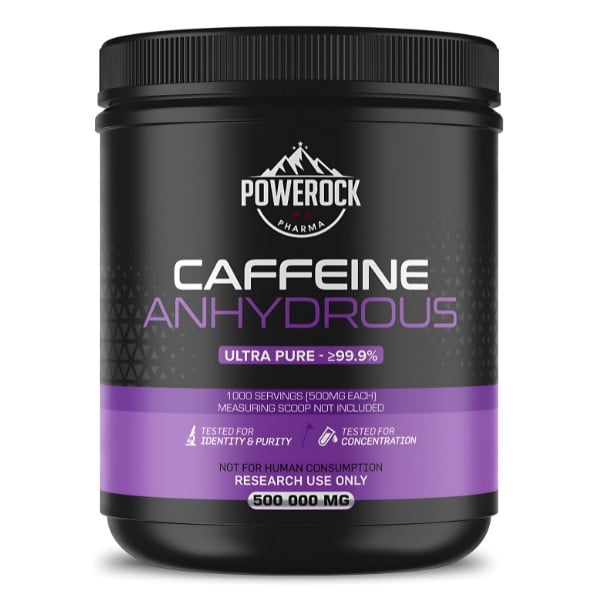Powerock Pharma Caffeine Anhydrous 500 000 mg
CAFFEINE ANHYDROUS (Anhydrous Caffeine) is a precise chemical reagent intended for advanced research on central nervous system stimulation and metabolic optimization. This compound (CAS 58-08-2) has been designed for effective studies of cognitive performance and precise analysis of metabolic processes. Its action is based on selective antagonism of adenosine receptors, particularly A1 and A2A. This high selectivity makes CAFFEINE ANHYDROUS widely used in research on cognitive functions and metabolic disorders.
CAFFEINE ANHYDROUS 500,000 mg
CAFFEINE ANHYDROUS (Anhydrous Caffeine) is a precise chemical reagent for advanced research on central nervous system stimulation and metabolic optimization. This compound (CAS 58-08-2) has been designed for effective cognitive performance studies and precise analysis of metabolic processes. Its action is based on selective antagonism of adenosine receptors, particularly A1 and A2A. This high selectivity makes CAFFEINE ANHYDROUS widely used in research on cognitive functions and metabolic disorders.
CAFFEINE ANHYDROUS Powerock Pharma – Properties
Discover the potential laboratory properties of CAFFEINE ANHYDROUS, which may support cognitive, metabolic, and performance research.
Cognitive Stimulation
Supports cognitive functions through antagonism of adenosine receptors in the brain.
Increased Alertness
Reduces the feeling of fatigue and increases alertness levels in laboratory studies.
Thermogenesis
Stimulates thermogenesis and lipolysis processes for metabolic research.
Selective Antagonism
Blocks adenosine A1 and A2A receptors without affecting other receptor systems.
Phosphodiesterase Inhibition
Increases cAMP levels by inhibiting phosphodiesterase enzymes.
Neurotransmitter Release
Supports the release of dopamine and norepinephrine in neurochemical research.
Purity ≥99.9%
Manufactured according to GMP, HACCP, and ISO 13485 standards with HPLC analysis.
Precise Action
Targeted action on adenosine receptors for optimal research results.
Mechanism of Action of Caffeine Anhydrous
- Adenosine receptor antagonism: Acts through selective blockade of adenosine A1 and A2A receptors, enabling increased neuronal activity.
- Increased neuronal activity: Blockade of adenosine receptors leads to improved cognitive function without the sedative effects typical of adenosine binding.
- Phosphodiesterase inhibition: Inhibits phosphodiesterase enzymes, leading to elevated levels of cyclic adenosine monophosphate (cAMP).
- Stimulation of thermogenesis: Increases metabolic rate through thermogenesis and lipolysis in metabolic research.
- Neurotransmitter release: Supports the release of dopamine and norepinephrine, which is crucial for studies on cognitive performance.
Why choose CAFFEINE ANHYDROUS from Powerock Pharma?
At Powerock Pharma, our priority is to deliver only the highest quality research reagents. Each batch of Caffeine Anhydrous is manufactured in facilities compliant with GMP, HACCP, and ISO 13485 standards. Our strict quality control oversight and use of state-of-the-art HPLC testing procedures ensure not only the effectiveness of the reagents but also their safety and reliability with a guaranteed purity of ≥99.9%. We collaborate with leading laboratories to ensure the purity and efficacy of the substances, providing durable and repeatable research results. By choosing Powerock Pharma, you are opting for excellence, safety, and unmatched quality of chemical reagents.
Research Protocol
How to prepare the solution:
Caffeine Anhydrous should be dissolved in an appropriate solvent according to the research protocol, usually in distilled water for oral administration. For precise calculation of concentrations needed for studies, we recommend using the active compound dosage calculator.
When to administer:
For the best research results, administration is recommended at regular intervals, preferably during active measurement periods according to the experimental protocol.
Research observation period:
The suggested research period is 4–8 weeks for accurate monitoring of both acute and chronic effects on cognitive and metabolic parameters.
Recommended amount for model A:
For studies involving model A, the recommended starting dose is 100–200 mg with adjustments based on research needs and observed tolerance.
Recommended amount for model B:
For model B, a dose of 200–400 mg is commonly used in research protocols, with adjustments as per specific study objectives.
Monitoring:
Continuous monitoring of parameters such as heart rate, blood pressure, and cognitive performance indicators is essential for accurate research data collection.
Frequently Asked Questions
- Research doses typically range from 100–400 mg depending on the research objectives, with 200 mg being a common starting point for cognitive studies and up to 400 mg for performance research protocols.
- Yes, Caffeine Anhydrous can be combined with various compounds for research purposes, including L-Theanine, creatine, and other nootropics, in accordance with appropriate research protocols and safety guidelines.
- Common observations include increased heart rate, elevated blood pressure, potential sleep disturbances, and in some cases, anxiety or tremors, especially at higher doses or in sensitive research subjects.
- Long-term studies should be conducted with appropriate monitoring and cyclic protocols. Continuous administration of high doses may lead to tolerance development and should be thoroughly evaluated.
- Store at controlled room temperature (≤25°C), protect from light and moisture in a tightly sealed container to maintain stability and purity throughout the research period.
- Our guarantee of ≥99.9% purity through HPLC testing, GMP-compliant production, and rigorous quality control ensure consistent, reliable results for your research applications.
Calculator for measuring research doses
Tip: 1 MG = 1000 MCG























